iuniti thrii Citizenship
1

2
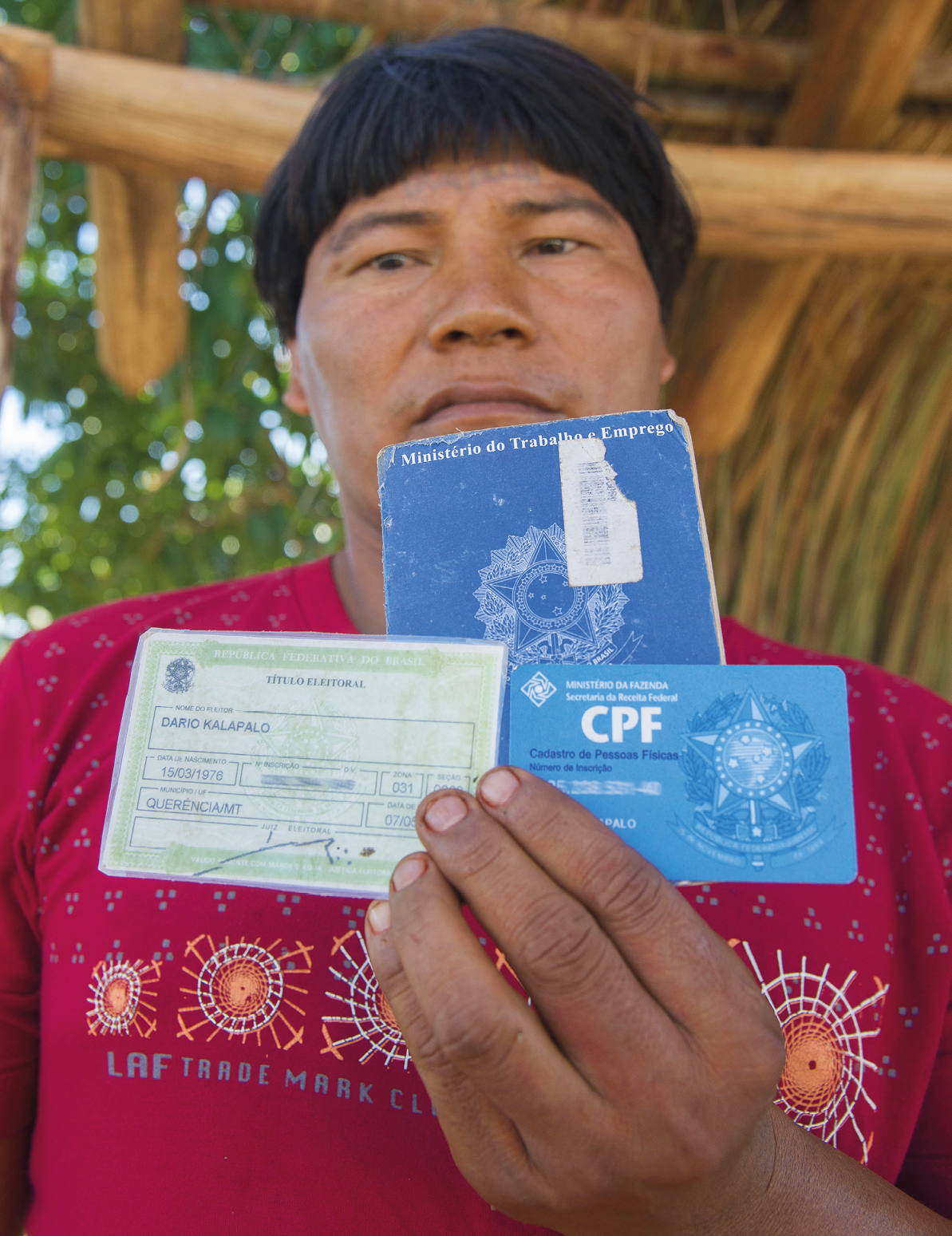
3
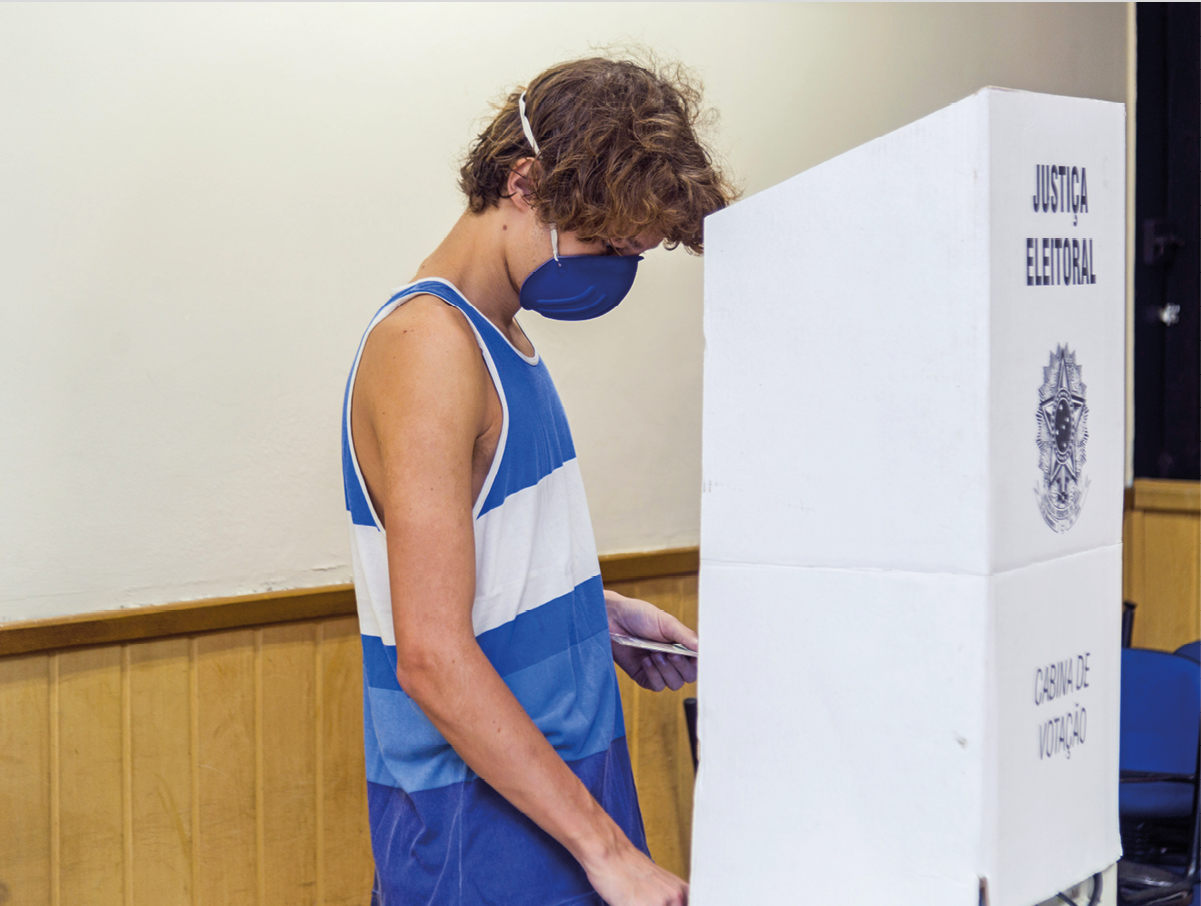
4
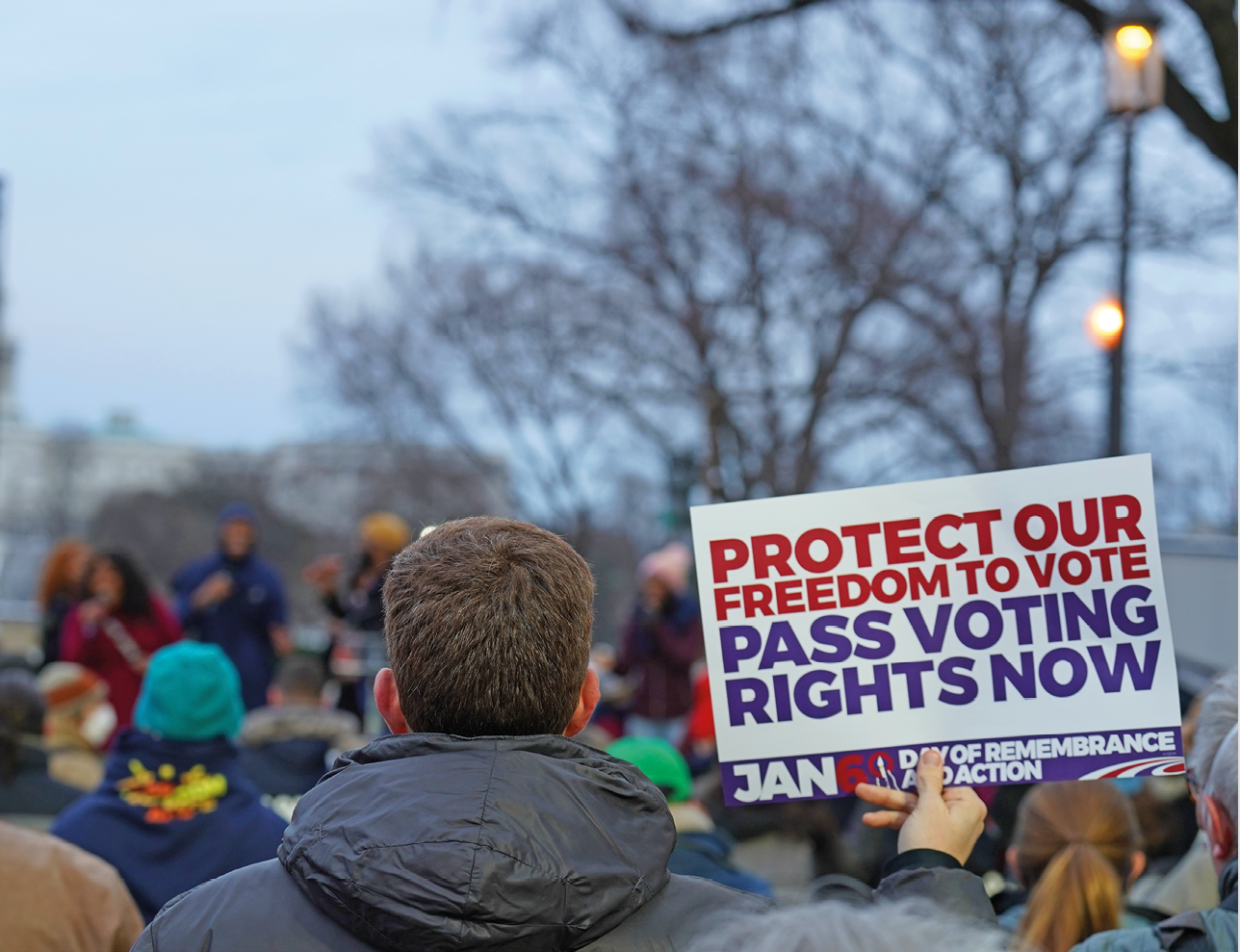
5
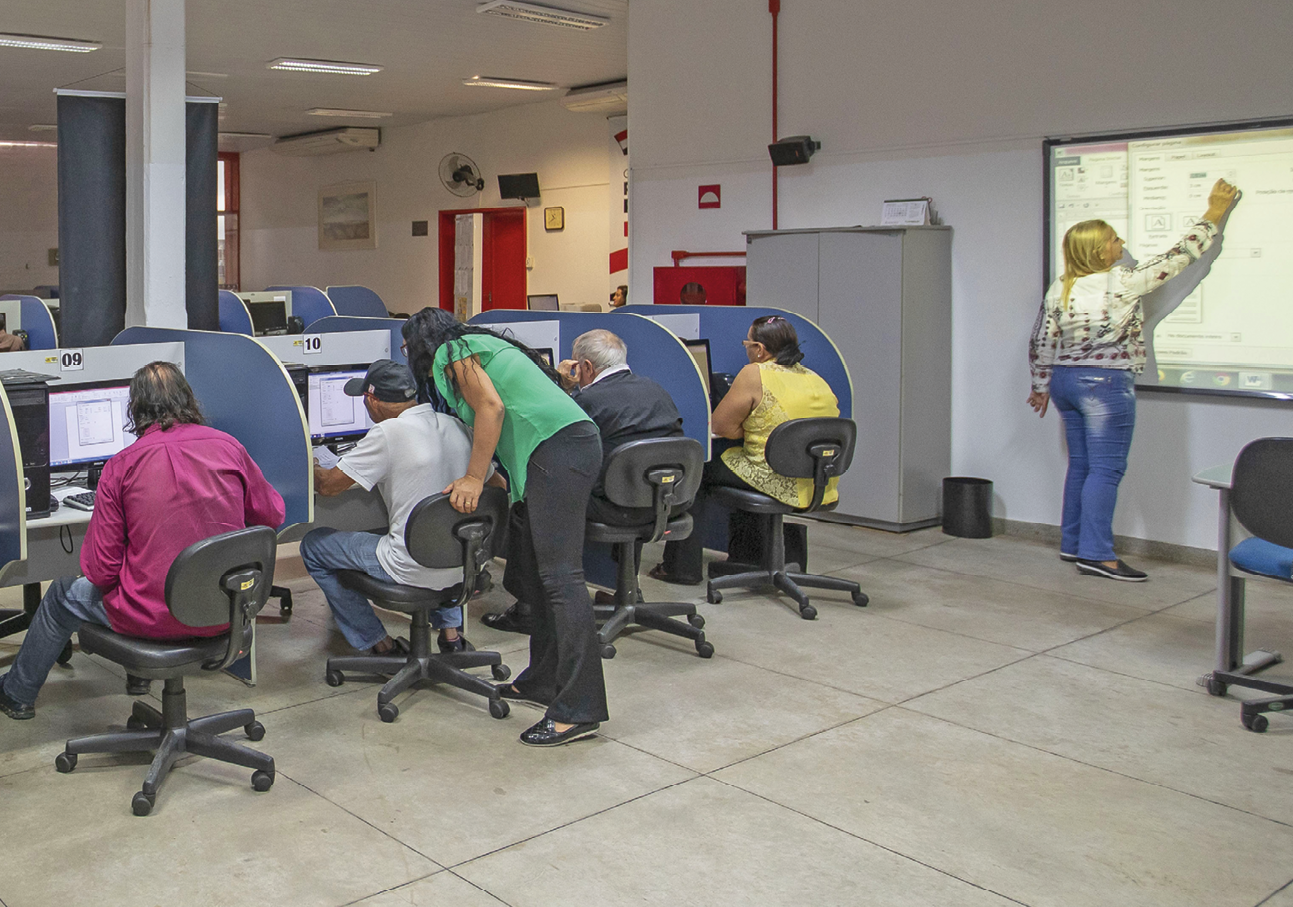
Respostas e comentários
As legendas das fotografias foram suprimidas do livro do estudante para fins didáticos: 1. Voluntários recolhem lixo na Noruega, em 2019. 2. Indígena Kalapalo da Aldeia Aiha mostra documentos em Querência (Mato Grosso), em 2018. 3. Eleitor adolescente durante votação em uma urna eletrônica no Rio de Janeiro (Rio de Janeiro), em 2020. 4. Manifestantes em Washington (dê cê), em 2022. 5. Alunos da terceira idade durante aula de computação em Presidente Prudente (São Paulo), em 2019.
Unit 3
Competências gerais e específicas desenvolvidas na unidade
A unidade tem por objetivo desenvolver as competências gerais 1, 2, 4, 5, 6, 7, 9 e 10 e as competências específicas de Língua Inglesa 1 e 2, que estão descritas na página trinta e um do Manual do Professor.
Habilidades desenvolvidas na unidade
ê éfe zero nove éle ih zero um / ê éfe zero nove éle ih zero dois / ê éfe zero nove éle ih zero três / ê éfe zero nove éle ih zero quatro / ê éfe zero nove éle ih zero sete / ê éfe zero nove éle ih zero oito
Objetivos da unidade
A unidade discute cidadania, um tema contemporâneo transversal (tê cê tê), e propõe reflexões sobre o que é ser um ou uma cidadão ou cidadã, apresentando tanto direitos como responsabilidades. Quanto aos aspectos linguísticos, a unidade apresenta os usos de have to e dos verbos modais must e should para falar sobre obrigações, proibições e recomendações, além de vocabulário relacionado a direitos e deveres. O assunto discutido ao longo da unidade possibilita um trabalho interdisciplinar com História e Geografia, visto que tais áreas podem contribuir para um maior aprofundamento sobre o que é cidadania.
First interactions
A seção visa provocar uma reflexão sobre alguns aspectos da cidadania, como a participação na sociedade, seja por meio de documentos que atestam o indivíduo como cidadão e permitem que ele estude, trabalhe, vote etcétera, ou por meio de ações que colaborem para uma sociedade melhor.
Objetivos
- Compreender um áudio sobre democracia.
- Compreender um fórum de discussão e participar de postagens em fóruns de discussão.
- Expressar opinião e se posicionar sobre diferentes tipos de govêrno.
- Reconhecer os usos de révi tchu, mãsti e xuldi e empregá-los para fazer recomendações e expressar obrigações, necessidades e proibições.
- Refletir e discutir sobre cidadania e reconhecer as características de um ou uma cidadão ou cidadã.
- Utilizar vocabulário para discutir sobre direitos e deveres de um ou uma cidadão ou cidadã.
First interactions
- Discuss these questions with your classmates.
- What is going on in picture 1? Why do you think people are doing that? Have you ever done anything similar to that? In your opinion, is this action important? Why?
- What do you see in picture 2? What do these documents allow you to do as a Brazilian citizenglossário ?
- What is happening in picture 3? In your opinion, why is this action related to being a citizen in Brazil?
- What are the people doing in picture 4? Based on the sign, what do they probably want?
- Have you ever taken part in a protest in Brazil? Why? In your opinion, is it a good way to make your voice heard by the authorities? Why?
- What is probably happening in picture 5? Have you ever done something like that?
- Which of these actions can contribute to a better society? Can you think of bad behaviors and attitudes that do not contribute to a better society? Give examples.

Agents of change
“To leave the world better than you found it, sometimes you have to pick up other people’s trash.” (Bill Nye)
What does it mean “to leave the world better than you found it?” Why does Bill Nye say that, in order to do so, sometimes “you have to pick up other people’s trash?” What kind of trash you may have to pick up in our society? How can you do that? What about the opposite situation: do you think you might be leaving some “trash” behind so that other people need to pick it up for you? If so, give some examples. What can you do to change that?
Respostas e comentários
1. a) People are doing volunteer work. Respostas pessoais. Ver Notas.
1. b) Respostas possíveis: A man holding his personal documents (título de eleitor, carteira de trabalho and cê pê éfe). They allow you to vote in an election, to prove an employment relationship (employer-employee relations), to have a bank account and to have an identification as a tax payer, for example.
1. c) Respostas possíveis: a man voting in political elections. Voting is one of the most important actions a citizen must take: choosing those who will represent all the people. Ver Notas.
1. d) They are protesting. They probably want to protect their freddom to vote. Respostas pessoais. Ver Notas.
1. e) Respostas pessoais. Ver Notas.
1. f) The girl is helping the women use the computer. Respostas pessoais.
1. g) Respostas pessoais. Possibilidades: Breaking public things, setting fire to means of transportation, stealing things from public or private places, etcétera Ver Notas.
Agents of change. Ver Notas.
Notas
Atividade 1 a professor ou professora, espera-se que os ou as estudantes notem que as pessoas estão fazendo trabalho voluntário. Ao lidar com esta imagem, sugere-se mencionar que as pessoas retratadas estão ajudando as pessoas afetadas pelo furacão Sandy, que atingiu a cidade de Nova York, nos Estados Unidos, em 2012. Pode-se, também, perguntar a eles ou elas quais tipos de voluntariado os ou as atraem mais.
c professor ou professora, espera-se que os ou as estudantes percebam que se trata de um momento de votação e que a pessoa está votando por meio de uma urna eletrônica. Ao explorar a imagem, pode-se perguntar se eles ou elas conhecem outra forma de votação, como as cédulas de votação em papel. Pode-se mencionar que o direito ao voto no Brasil faz parte da Constituição Federal de 1988.
d professor ou professora, espera-se que os ou as estudantes notem que a imagem apresenta uma manifestação pacífica em que jovens protestam pelo direito ao voto a partir dos 16 anos de idade em Londres, na Inglaterra. Pode-se, ao lidar com essa imagem, explorar a questão das eleições e solicitar uma breve pesquisa sobre quais grupos tinham o direito de votar no passado. Sugere-se comentar com os ou as estudantes que é possível votar a partir dos 16 anos no Brasil e pedir que pesquisem os motivos de esse direito ter sido estendido a esses ou essas eleitores/as.
e professor ou professora, é possível propor uma discussão com os ou as estudantes sobre os direitos e deveres dos ou das cidadãos ou cidadãs de levar os seus questionamentos às autoridades, na intenção de provocar ou evitar mudanças na sociedade.
g professor ou professora, espera-se que os ou as estudantes mencionem que todas as ações representadas podem contribuir para uma sociedade melhor e mais justa: participando ativamente como cidadão ou cidadã, expressando o direito de voz de forma respeitosa e contribuindo para uma convivência mais harmoniosa, cuidando da comunidade e auxiliando o próximo. Sugere-se pedir que mencionem comportamentos que podem ser perigosos ou que façam mal para nossa sociedade e que os justifiquem.
Agents of change
professor ou professora, sugere-se promover uma discussão sobre o papel de cada um ou uma dos ou das estudantes na sociedade, levando-os/as a refletir sobre quais atitudes deles ou delas podem não estar contribuindo para um futuro melhor no país. Se necessário, explicar que a citação do boxe é um convite à reflexão acerca de nossa responsabilidade como cidadãos ou cidadãs na promoção de um mundo melhor para as próximas gerações. Espera-se que, assim, eles ou elasmencionem atitudes negativas, como não preservar o ambiente, desrespeitar as leis de trânsito (como pedestres, no momento, mas como possíveis futuros condutores), não votar com consciência e responsabilidade, entre outros comportamentos que podem ser nocivos para esta e para as próximas gerações. Convém pedir, então, que cada um ou uma apresente possíveis soluções para esses problemas.
Informações adicionais
Bill Nye (1955-): cientista, apresentador e engenheiro mecânico estadunidense, ficou famoso pelo programa de divulgação científica Bill Nye the Science Guy. Também participou de séries para plataformas de streaming. Tem se dedicado a falar sobre as mudanças climaticas, como no livro publicado em 2015:
• NYE, Bill. Unstoppable: Harnessing Science to Change the World. NewYork: Saint Martin Press, 2015.
Reading
Forum post
Pre-reading
- Look at the forum post in activity 2. Then read the questions and discuss them with your classmates.
- Which elements can help you identify that it is a forum post? Give examples.
- Have you ever read a forum post? If so, what was ou were it ór dei about?
- Have you ever created or commented on a forum post? What was it about? If not, would you like to create one? What would it be about?
Reading
2. Read some comments on a forum post. Then check the appropriate answers in your notebook.

DEBATES OPINIONS FORUMS POLLS

Do young people appreciate and respect elders?
Elizabeth B.
The youth of today are like youth of yesterday and of your day, dear reader. Appreciation and respect are learned by example of their parents and not by what parents say. Kids do what they see, not what they hear.
2
Julie F.
Most young people in Australia do not show much respect to their Elders. Few put themselves out to visit their Grandparents or Aunts and Uncles regularly. Especially if the aged person is in care. The middle aged adults often put their children’s wants/needs/demands ahead of their parents’. [...]
1
Sandra B.
Youth never liked adults. We all know that young people always wanted and want to do things on their own; which is correct. They should experience the world in their own way.

Respostas e comentários
1. a) Respostas possíveis: Some visual elements can be mentioned, such as the organization of the page, the headings, and an initial question that guides the discussion, followed by replies below.
1. b) Respostas pessoais. Espera-se que os ou as estudantes percebam que o formato de fórum é comumente utilizado nas redes sociais, portanto é possível que essa ferramenta já faça parte de seu cotidiano.
1. c) Respostas pessoais. O objetivo é que os ou as estudantes, com base em temas que lhes interessam, citem diferentes utilidades de um fórum (sanar dúvidas pontuais e promover debates, por exemplo).
2. Ver Notas.
Reading
O objetivo da seção é trabalhar as características de um fórum da internet. Para isso, apresenta uma postagem em um fórum e as respostas dos ou das participantes. O tema da cidadania também é abordado por meio da questão do respeito a pessoas idosas. As habilidades desenvolvidas são ê éfe zero nove éle ih zero sete: identificar argumentos principais e as evidências/exemplos que os sustentam (ao trabalhar com as diferentes opiniões dos participantes do fórum), ê éfe zero nove éle ih zero oito: explorar ambientes virtuais de informação e socialização, analisando a qualidade e a validade das informações veiculadas (ao trabalhar com aspectos do gênero fórum), e ê éfe zero nove éle ih um três: reconhecer, nos novos gêneros digitais (blogues, mensagens instantâneas, tweets, entre outros), novas formas de escrita (abreviação de palavras, palavras com combinação de letras e números, pictogramas, símbolos gráficos, entre outros) na constituição das mensagens (ao trabalhar com maneiras diferentes de se expressar por escrito no meio digital).
Notas
Atividade 2 professor ou professora, sugere-se discutir com os ou as estudantes a importância da modalização do discurso em discussões, como fóruns, visto que não é adequada a generalização, isto é, utilizar frases como “todo idoso” ou “nenhum jovem”, por exemplo. Recomendar que, ao expressar opiniões, utilizem frases com modalizadores, como “muitos idosos”, “alguns jovens” etcétera b professor ou professora, pode ser interessante comentar com os ou as estudantes a possibilidade de se concordar com alguém sobre um assunto, mas não completamente. Pedir a eles ou elas que tentem levantar exemplos de uma situação em que, de maneira geral, pensavam da mesma forma que um ou uma colega ou familiar, por exemplo, mas que, em aspectos menores, mas igualmente importantes, discordavam parcial ou totalmente.

Amelia G.
After watching how y'all handled covid? You honestly don't deserve respect. [...]
3
1
Michael R.
Hell, No! They don’t even Respect themselves! But, it’s not just the young, but the adults too. People forget, that one day, they will be old! Every time I ride the bus, I see the young folks harassing the elderly. They either heckle them or push them out of the way, as they leave the bus. Sad!
Karen R.
Usually yes. I usually only hear this question from people who think that they are owed respect rather than wanting to have to earn it.
Paula S.
My observations of almost 70 years are that young people will appreciate and respect elders who they feel deserve that respect and appreciation. There is no “automatic” respect or appreciation. In a way you can understand why: in the past elders had developed skills and experience that, passed on, could help young people navigate their world better. But the skills needed to navigate today’s (and tomorrow’s world) are often technological skills that elders don’t have, that didn’t exist even 10 years ago. As for experience and wisdom, well, I don’t think young people themselves have enough experience to understand what a valuable resource that is, even in a world that makes older skills obsolete.
Jim M.
I don’t think most do. My kids do, and many of their friends are very sensitive to the needs and life-contributions of their elders. But, on the whole, from my 70 years of experience around young people, I think most of them have little use for older people and are either afraid of taking care of them, resent them, or simply wish they would go away.
Pieter V. H.
If we look at how many elders treat youngsters: the contempt, the expectations, the lack of understanding, the distrust – then I understand that youngster are not always appreciative and showing respect. Don’t get me wrong, I agree that everybody has the power to choose how to react regardless of how the other person behaves. But then, why don’t many elders live up to the saying “old and wise”? Why don’t they (seem to) understand that young people don’t always have the necessary perspective yet to be the first one to break a negative cycle? To be who they want to be, to act instead of reacting to unconstructive energy? Why aren’t elders showing the way how to break cycles, how to act even though the other person “doesn’t deserve it”? Why don’t they show young people how to change peoples behavior by being that change, by not expecting others to do something first in order for them to do it? So do young people appreciate and respect elders? Some do, in some situations. Sometimes I understand why, sometimes I don’t.
DO YOUNG people appreciate and respect elders? Quora. Disponível em: https://oeds.link/TAQBNO. Acesso em: 29 junho 2022.
Respostas e comentários
Acompanhando a aprendizagem
professor ou professora, para aprofundar a discussão acerca dos direitos das pessoas idosas e da necessidade do respeito e cuidado em relação a elas, pode-se pedir que os ou as estudantes tragam manchetes de jornal (em português e, se possível, em inglês), com notícias sobre desrespeito e/ou maus-tratos às pessoas mais velhas. Sugere-se, ainda, mencionar que muitas atitudes boas e cordiais não se tornam notícia, o que impossibilita a apresentação de muitos dados concretos sobre jovens que, ao contrário, respeitam e valorizam as gerações mais velhas. A unidade abordará o Estatuto da Pessoa Idosa (Lei nº 10.741/2003) na próxima seção.
- It is possible to say that the main objective of the forum post is to discussreticências
- whether the elders have to be respected or not.
- if young people are not respected by the elders.
- whether young people respect the older generations or not.
- The participants who think young people appreciate and respect elders seem toreticências
- totally agree with each other.
- have different points of view.
- think elders don’t respect them.
- By the comments of those who think young people don’t appreciate and don’t respect the elders, we may say thatreticências
- some participants are young.
- all participants who took part in the forum post could be considered “the elders.”
- all participants are teenagers.
- Considering the posts presented, it is possible to say that most forum participants agree thatreticências
- the elders respect the young.
- the young do not respect their elders.
- the young and the elders respect one another.
- Read each comment again. Then write tí (true) or éf (false) in your notebook.
- In comment 1, the participant says that parents should respect their children if they want their children to respect them.
- In comment 2, the participant talks about young people in general, around the world.
- In comment 3, the participant suggests that young people don’t need help from adults to experience the world.
- In comment 4, the participant uses a specific situation to justify her answer.
- In comment 5, it is possible to say that the participant believes that young people don’t respect their elders, but are respected by them.
- In comment 6, it is possible to say that the participants didn’t understand the question.
- In comment 7, it is possible to infer that the skills needed to navigate the world in the past don’t necessarily work in today’s world.
- In comment 8, the participant clearly says that he is a young person.
- In comment 9, the participant mentions several elders’ attitudes towards young people. In his opinion, the elders respect the young people.
- Read these participants’ ideas and find arguments in the text to support them. Use your notebook.
- Participant 1: “Appreciation and respect are learned by example reticências”
- Participant 5: “They don’t even Respect themselves!”
- Participant 9: “reticências I understand that youngster are not always appreciative and showing respect.”
Respostas e comentários
2. a) três.
2. b) dois. Ver Notas.
2. c) um. Ver Notas.
2. d) dois.
3. a) tê
3. b) éfe
3. c) tê
3. d) tê
3. e) éfe
3. f) éfe
3. g) tê
3. h) éfe
3. i) éfe
4. Ver Notas.
4. Primeira afirmativa. “Kids do what they see, not what they hear.”
4. Segunda afirmativa. “reticências it’s not just the young, but the adults too.”
4. Terceira afirmativa. “reticências look at how many elders treat youngsters: the contempt, the expectations, the lack of understanding, the distrust reticências”
Notas
Atividade 2
c professor ou professora, ao lidar com esta questão, convém discutir com os ou as estudantes sobre o porquê de jovens defenderem os idosos, não importando o assunto em questão (trata-se de direitos humanos, e não do interesse de um grupo social específico). Pedir a eles ou elas que deem exemplos de como buscar ser imparcial e mais justo ou justa, ao conviver em sociedade, tentando enxergar os questionamentos de um ponto de vista mais amplo.
Atividade 4
professor ou professora, convém pedir aos ou às estudantes que mencionem se consideram convincentes e consistentes os posicionamentos nos comentários do fórum da seção. Pedir que expliquem por que pensam dessa forma e deem exemplos para justificar suas respostas. Pedir, ainda, que comentem com quais afirmações e argumentos eles ou elas concordam e com quais discordam, sempre justificando seus motivos.
- Read the text again and check the appropriate options, according to this forum’s characteristics.
- Language register:
- formal
- informal
- Kind of post:
- pãblic
- anonymous
- Personal opinion:
- présânt
- absent
- Information about the participants other than their names:
- présânt
- absent
- Language register:
Going further
The word “forum” comes from Latin and was used to refer to the main center of a Roman city. It was usually located near the center of a Roman town and it served as a public area in which commercial, economic, political and social activities occurred. One of the most important forums in the city of Rome was the Forum Romanum.
Research to find out what an online forum and the Roman forum have in common and what their differences are. Then discuss about it with your classmates.

Post-reading
- Discuss these questions with your classmates.
- In your opinion, do people respect their elders in your city or neighborhood? Give some examples.
- What about you? Do you show enough respect to the elderly? Give some examples.
- What is the problem with the following statement: “We only have to respect the people who respect us?” What can be the consequences of this attitude?
- Do you think that some countries and cultures show more respect to the elderly than other countries and cultures? Why? Do you think people can learn how to respect others? How?
- Do you agree with any participant’s ideas? Why? How would you defend your ideas? Which arguments and examples would you present?
Respostas e comentários
5. Ver Notas.
5. a) dois.
5. b) um.
5. c) um.
5. d) dois.
Going further. Os fóruns eram espaços de discussão de assuntos de importância para a cidade. Os fóruns on-line são espaços de discussão de temas de interêsse dos participantes. Ver Notas.
6. Respostas pessoais. Ver Notas.
Notas
Atividade 5
professor ou professora, convém ressaltar que existem diferentes tipos de fórum, e eles podem ser tanto informais como formais – estes costumam tratar de assuntos profissionais ou acadêmicos, por exemplo.
Atividade 6 Se possível, sugerir um debate feito pelos/pelas estudantes, que vão defender ou refutar uma das ideias dos ou das participantes do fórum apresentado na seção, utilizando os próprios argumentos e exemplos. Se desejarem, eles ou elas podem discutir outros pontos relacionados ao tema abordado no fórum. Orientar os ou as estudantes a observar o vocabulário apresentado na seção “Speaking”, que aborda algumas expressões que podem ser utilizadas em discussões e debates.
lenguage in iusi uon
Expressing obligation and recommendation (have to, must, should)
1. Read the article about a speech given by the ú êne High Commissioner for Human Rights and answer the questions in your notebook.

NEWS Home | Video | World | UK | Business | Tech | Science | Stories | Entertainment & Arts | Health
Asia | China | India
Protection of older persons’ rights needed now ‘more than ever’: Bachelet
11 April 2022 Human Rights
Michelle Bachelet was addressing the Working Group on Ageing, at UN Headquarters in New York, the first to do so in person, since it began its “vital role”, in 2011, she said. “Today, more than ever, older persons need stronger protection to fully enjoy their human rights”, she added. “But the reality is that international legal frameworks – which should protect everybody, without discrimination – still render older persons invisible.”
[...] “We should ask ourselves: what kind of world do we want to live in by then? I would like to imagine a world where older persons everywhere are guaranteed to live a life of dignity, with economic security.”
“A world where they can continue their work and contribute to society for as long as they wish and are able to. Where they can live independently and make their own decisions.”
[...] Strengthening the human rights of older persons, is therefore “an urgent imperative that we all must strive towards”, said the High Commissioner.
For too long, their rights have suffered from “inadequate protection”, and they continue to be overlooked and neglected in national policies.
PROTECTION of older persons’ rights needed now ‘more than ever’: Bachelet. Human rights, United Nations, 11 abril 2022. Disponível em: https://oeds.link/PmZbqk. Acesso em: 10 junho 2022.
- What is the news article about?
- Who was she talking to when she gave the speech?
- In the sentence “Strengthening the human rights of older persons, is therefore ‘an urgent imperative that we all must strive towards’”, what is the verb used to express obligation?
- What word is used in the second paragraph to express a recommendation?
- According to the Michelle Bachelet, how are the elderly population considered by the international legal frameworks?
f. What do you think about the idea that the human rights of older people continue to be overlooked and neglected in national policies? How are the older people treated in your community?
Respostas e comentários
1. a) It is about the human rights of older people.
1. b) She was talking to the members of the Working Group on Ageing.
1. c) Must.
1. d) Should.
1. e) The elderly are still considered invisible.
1. f) Respostas pessoais. Ver Notas.
Language in use 1
A seção busca desenvolver a habilidade ê éfe zero nove éle ih um seis: empregar, de modo inteligível, os verbos should, must, have to, may e might para indicar recomendação, necessidade ou obrigação e probabilidade), com foco nos usos de have to e nos verbos modais should e must para indicar recomendação, necessidade ou obrigação. Esses verbos são apresentados no contexto do assunto da unidade para ampliar a discussão.
Notas
Atividade 1 f professor ou professora, embora os ou as estudantes tenham respostas diversas, espera-se que percebam que a lei foi criada para tentar resolver um problema de saúde pública: o abandono de idosos. Se achar pertinente, é possível explorar melhor o texto ao problematizá-lo, perguntando aos ou às estudantes se concordam ou não com a lei chinesa e o porquê. Pode-se esperar que os ou as estudantes favoráveis à lei citem a necessidade de a justiça proteger as pessoas idosas e garantir o respeito a elas e às suas demandas, inclusive psicológicas, como a necessidade de atenção e carinho por parte de seus familiares. Já aqueles ou aquelas que se mostrarem contrários à iniciativa podem mencionar a impossibilidade de se fiscalizarem todos ou todas os ou as responsáveis pelas pessoas idosas, visto que a lei não determina, por exemplo, quantas visitas deveriam ser realizadas ou quantas ligações deveriam ser feitas e com qual frequência.
Going further
Do you know which laws in Brazil protect the elderly? Research them and present your findings to your classmates.

According to Earl, what are the reasons why people should respect the elderly? Do you think his mistake makes him less intelligent and experienced than Nelson?
Have you ever tried to help an older person and was afraid of being disrespectful? How could you help an older person? How could they help you?
2. Now read this comic strip about obligations of a citizen and complete the statements in your notebook.

Mother Goose & Grimm, 2018.
- The dog doing community service ◆.
- is obliged to do it
- freely decided to do it
- In the sentence: “Herb, how much longer do you have to do your community service?”, “have to” expresses an ◆.
- advice
- obligation
- It is possible to say that “have to” and ◆ express the same meaning.
- xuldi
- mãsti
Respostas e comentários
Going further. Primeiro item: Elderly people are older and wiser than young people and deserve respect for that. Respostas pessoais. Ver Notas.
Going further. Segundo item: Respostas pessoais. Ver Notas.
2. a) um.
2. b) dois.
2. c) dois.
Going further
professor ou professora, espera-se que os ou as estudantes pesquisem e mencionem aos ou às colegas o Estatuto da Pessoa Idosa (Lei norteº 10.741/2003), que determina que toda pessoa com idade igual ou superior a 60 anos tem direito a atendimento prioritário, proteção à integridade física, moral e psíquica, além de atendimento médico, remédios e descontos em atividades de lazer.
Going further
professor ou professora, verificar se os ou as estudantes compreenderam a expressão utilizada pelo neto de Earl no último quadrinho: “[to have] your shirt on inside-out” (“vestir a camisa do avesso”). Na discussão, convém ressaltar que o fato de algumas pessoas idosas cometerem pequenos deslizes por conta de eventuais esquecimentos ou outras questões relacionadas à idade não fazem com que elas deixem de merecer respeito. Na tirinha, o avô do menino está vestindo a camisa do avesso, mas isso não o torna incapaz ou menos respeitável. Perguntar, ainda, se os ou as estudantes acham que o neto de Earl foi desrespeitoso ao dizer ao avô que ele estava com a camisa vestida do lado contrário. Pedir, então, que eles ou elas mencionem se alguma vez tiveram receio de ajudar uma pessoa idosa e por qual razão. Discutir com eles ou elas o que pode ser considerado ofensivo dizer a uma pessoa idosa e o que pode ser considerado apropriado.
3. Now read another comic strip related to obligations and answer the questions in your notebook.

- Why is the woman happy?
- In the sentence: “reticências we didn’t have to lift a finger.”, the woman says that she ◆.
- had to make a lot of effort
- didn’t have to make any effort
- When used in the ◆ form, “have to” expresses ◆.
- affirmative/a suggestion
- negative/lack of necessity (no necessity)
- Consider the sentence “we don’t have to lift a finger” in the present. In this case, “have to” ◆ be replaced by “must” with no change in meaning because they ◆.
- can/both express the same thing
- cannot/express different things
4. Look at this picture of a protest in the United States, and answer the questions in your notebook.

- This is a picture of one of the Black Lives Matter protest marches. Have you heard of the Black Lives Matter movement?
- It is possible to conclude that the woman is protesting. What is she protesting against?
- Do you believe the government should hear protests like this? Why?
5. Think about your community and discuss recommendations, obligations, prohibitions and things that are not necessary to live peacefully. Work in pairs and use your notebook to complete the chart.

|
Recommendations |
Obligations |
Prohibitions |
Lack of necessity |
|---|---|---|---|
Respostas e comentários
3. a) Because the robot vacuum cleaned the house and they didn’t have to clean it themselves.
3. b) dois.
3. c) dois.
3. d) dois.
4. a) It is a political and social movement that fights against racism, discrimination, and inequality experienced by black people.
4. b) She’s protesting against police violence towards black people.
4. c) Respostas pessoais.
5. Respostas pessoais. Ver Notas.
Notas
Atividade 5
professor ou professora, recomenda-se fazer a verificação das respostas dos ou das estudantes e, se necessário, oferecer outras possíveis respostas, a fim de auxiliá-los ou auxiliá-las com eventuais dúvidas.
lenguage in iusi tchu
Rights and responsibilities
- Look at the pictures and match them to their descriptions. Which actions and attitudes can make our city and country a better place and which ones are wrong and shouldn’t be done?
- espaço para resposta

b. espaço para resposta

c. espaço para resposta

d. espaço para resposta
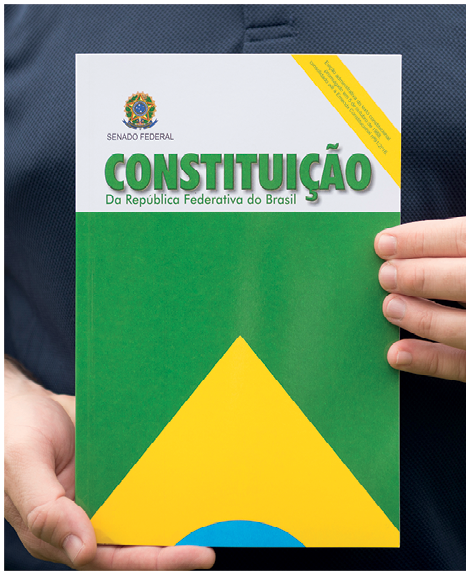
e. espaço para resposta

f. espaço para resposta

g. espaço para resposta

h. espaço para resposta

i. espaço para resposta

j. espaço para resposta

- Commiting a crime.
- Paying taxes.
- Buying endi ór ór using pirated products.
- Littering.
- Respecting traffic laws.
- Walking distractedly when crossing the road.
- Respecting priority seats.
- Helping people in need.
- Respecting the elderly.
- Knowing the law.
2. Based on the actions in activity 1, discuss with your classmates which of them are recommendations, which are obligations and which are prohibitions. Then write sentences in your notebook.
Respostas e comentários
1. Good attitudes: paying taxes, knowing and respecting the law, respecting traffic laws, respecting priority seats, respecting the elderly, helping people in need. Bad attitudes: littering, walking distractedly when crossing the road, buying endi ór ór using pirated products, commiting a crime.
As legendas foram suprimidas para fins didáticos.
1. um. j.
1. dois. c.
1. três. h.
1. quatro. a.
1. cinco. e.
1. seis. b.
1. sete. f.
1. oito. Respostas possíveis: i ou g.
1. nove. Respostas possíveis: i ou g.
1. dez. d.
2. Respostas possíveis: You mustn’t litter.; You shouldn’t walk distractedly when crossing the road.; You have to pay taxes.; You have to know the law.; You must respect traffic laws.; You have to respect priority seats.; You should respect the elderly.; You mustn’t buy pirated products.; You should help people in need.; You mustn’t commit a crime. Ver Notas.
Language in use 2
A seção procura expandir o vocabulário relacionado à cidadania e aos direitos e deveres dos ou das cidadãos ou cidadãs, promovendo uma reflexão sôbre o tema. Trabalham-se, portanto, as habilidades ê éfe zero nove éle ih zero um: fazer uso da língua inglesa para expor pontos de vista, argumentos e contra-argumentos, considerando o contexto e os recursos linguísticos voltados para a eficácia da comunicação, e ê éfe zero nove éle ih um seis: empregar, de modo inteligível, os verbos should, must, have to, may e might para indicar recomendação, necessidade ou obrigação e probabilidade (com foco nos usos de have to e nos verbos modais should e must).
fóra da sala de aula
professor ou professora, pode-se propor um trabalho interdisciplinar com História, em que os ou as estudantes, em grupos, pesquisem leis brasileiras antigas e que foram alteradas com o passar do tempo – é possível pré-selecionar uma lei por grupo, por exemplo. Depois, sugere-se que apresentem suas pesquisas ao restante da turma, explicando os acontecimentos em forma de linha de tempo.
Notas
Atividade 2 professor ou professora, sugere-se explicar aos ou às estudantes que, nesse momento, eles/as deverão reler as atitudes mencionadas na atividade 1 e, então, decidir o que é recomendado queos ou as cidadãos ou cidadãs façam ou não, o que é obrigatório e aquilo que é proibido, dentro das normas da sociedade. Em seguida, deverão escolher qual verbo utilizar, de acordo com o que cada um expressa.
3. What are the rights of a citizen? What about the responsibilities of a citizen? In your notebook, complete the chart using the words in the box.
respecting diversity paying taxes freedom of thought obeying the law education respecting the rights and beliefs of others mobility voting freedom of expression belief and religion

|
Rights |
Responsibilities |
|---|---|
- Do you know what the rights and responsibilities from activity 3 mean? In your notebook, write them next to their definition.
- Freedom of movement.
- Respecting other people’s color, race, gender, age, origin.
- Letting the government use part of your money to help fund common resources (education, security and health, for example).
- Behaving respectfully.
- Being able to have your own opinions and express them aloud.
- Electing public officials.
- Being able to express your beliefs and take part in religious worship.
- Being able to study for free.
- Respecting the rules of a country, state or city.
- Discuss these questions with your classmates.
- Can you give more examples of a citizen’s rights and responsibilities?
- Have you ever done anything that made your community, city or country a worse place? Why must these actions be avoided?
- What do you usually do to be a good citizen? What are other things you could do to be a better citizen?
Going further
Do some research on your rights and responsibilities in Brazil and discuss your findings with your classmates.
Going further
Read this excerpt from the Diretrizes Curriculares Nacionais da Educação Básica about citizenship:
“reticências participação ativa dos indivíduos nas decisões pertinentes à sua vida cotidiana [...]: participar de decisões públicas significa obter direitos e assumir deveres, solicitar ou assegurar certas condições de vida minimamente civilizadas.”
In your opinion, why is it important to understand the concept of citizenship?
Respostas e comentários
3. Rights: education; freedom of expression; freedom of thought, belief and religion; mobility; voting.
Responsibilities: obeying the law; paying taxes; respecting diversity; respecting the rights and beliefs of others; voting. Ver Notas.
4. Ver Notas.
4. a) Mobility.
4. b) Respecting diversity. respecting diversity
4. c) Paying taxes.
4. d) Respecting the rights and beliefs of others.
4. e) Freedom of expression.
4. f) Voting.
4. g) Freedom of thought, belief and religion.
4. h) Education.
4. i) Obeying the laws.
5. Respostas pessoais. Ver Notas.
Notas
Atividade 3
professor ou professora, sugere-se mencionar que alguns direitos e algumas responsabilidades dos ou das cidadãos ou cidadãs variam de acordo com o país. Citar que o voto, por exemplo, não é visto como responsabilidade em alguns países, pois não é considerado obrigatório. Por outro lado, pode ser pertinente mencionar quais são as penalidades para as pessoas que, no Brasil, não votarem durante as eleições ou não justificarem sua ausência, como o pagamento de multa e a impossibilidade de se inscrever em concursos públicos ou emitir passaporte.
Atividade 4
professor ou professora, ao lidar com esta atividade, sugere-se mencionar brevemente alguns direitos assegurados aos ou às cidadãos ou cidadãs, bem como suas responsabilidades. Pode ser interessante citar os artigos 5º, 6º e 7º da Constituição Federal de 1988, bem como trechos do Programa Nacional de Direitos Humanos pê ene dê agá-3 (Decreto norteº 7.037/2009) ou das Diretrizes Nacionais para a Educação em Direitos Humanos (Resolução cê êne ê barra cê bê ê norteº 1/2012).
Atividade 5
professor ou professora, é possível sugerir que os ou as estudantes reflitam e discutam sôbre boas e más ações dentro de uma sociedade igualitária e que respeita as diferenças; assim, retoma-se a teoria dos direitos e das responsabilidades dos/das cidadãos/cidadãs em uma comunidade e incentiva-se os ou as estudantes a colocá-los em prática.
lissenin
Democracy
Pre-listening
- Answer the questions in your notebook.
- Do you know what democracy is?
- Do you think democracy has always been the way we know it today? Do you think it has changed? Why?
Listening
2. You are going to listen to two classes about democracy. Listen to the first one and check all the appropriate answers in your notebook.

Clique no play e acompanhe a reprodução do Áudio.
- According to the audio, it is possible to say that the man is talking about espaço para resposta.
- democracy in Sparta, Greece
- democracy in Rome, Italy
- democracy in Athens, Greece
- In this place, only espaço para resposta could be citizens.
- men
- men and women
- local men and foreign men (people from other city-states)
- To be considered a citizen in this place, espaço para resposta had to be born in this place too.
- iú
- iór pérêntis
- you, your parents, your grandparents and many other ancestors of yours
3. Listen again. What were the benefits of being an Athenian citizen? In your notebook, check all the rights that are mentioned in the audio.

An Athenian citizen couldreticências
- vote.
- debate.
- have free education.
- have his own property.
- become a president.
- serve on juries.
- have justice and religious rights.
- defend the city-state.
- receive money assistance from the government.
- have healthcare and healthy working conditions.
4. Listen to the extract from the second class. Then write tí (true) or éf(false) in your notebook.

Clique no play e acompanhe a reprodução do Áudio.
- The audio mentions the kinds of government in Athens, Greece over history.
- The teacher states that there are no differences between democracy in the u ésse and in Athens.
- The audio doesn’t mention any other kind of government.
d. According to the audio, democracy means “the power of the people.”
Respostas e comentários
1. a) Respostas pessoais. Respostas possíveis: Democracy, which means “government by the people”, is a political regime in which citizens participate actively by voting.
1. b) Respostas pessoais. Ver Notas.
2. a) três.
2. b) um.
2. c) três.
3. a, b, d, f, g, h.
4. a) T.
4. b) F.
4. c) F.
4. d) T.
Listening
O objetivo da seção é desenvolver as habilidades ê éfe zero nove éle ih zero dois: compilar as ideias-chave de textos por meio da tomada de notas e ê éfe zero nove éle ih zero três: analisar posicionamentos defendidos e refutados em textos orais sobre temas de interesse social e coletivo (apresentando videoaulas sobre democracia em Atenas e, também, sobre as diferenças entre a democracia ateniense antiga e a estadunidense atual).
Transcript: Democracy – Athens
Athens had citizens, which many other places at the time did not have. However, only men got to be citizens – and not just any man: his mother, father, grandfather, grandmother, and sometimes even further down the family tree had to be born in Athens.
Any man with complete citizen rights could go to the assembly where they could speak and vote freely. The citizens decided how the city was run and this was called a democracy. There are disputes about whether or not this was a true democracy. Women and many men did not have citizen rights: they could not vote, participate in the assembly or serve on juries.
Citizens had to pay taxes, which the government used for festivals and other special events.
There are some facts here about citizenship: every citizen had the right to own land, citizens had access to justice and religious rights, and taking part in the defense of the city. Being a citizen of Athens was a great honor in ancient Greece. To voice your opinion on how your government was run was a right and responsibility held by few. That’s what it meant to be a citizen in Athens.
DEMOCRACY In Athens. 2014.1 vídeo (6métros49segundos). Publicado pelo canal míster Corwin. Disponível em: https://oeds.link/NC2N8J. Acesso em: 3 julho 2022.
Notas
Atividade 1 b professor ou professora, sugere-se explicar aos ou às estudantes que houve um processo de mudança do que conhecemos hoje por democracia – e que é natural que ela tenha passado por adaptações e alterações e seja aplicada diferentemente em cada país.
5. Listen to the first part of the second class. The teacher mentions the kinds of government that Athens had. In your notebook, number them from 1 to 4 in the order they occurred in Athens.

- democracy
- monarchy
- tyranny
- oligarchy
6. Listen to the first part of the second class again. Who has the power in each kind of government? Match the items in your notebook.

Clique no play e acompanhe a reprodução do Áudio.
- democracy
- monarchy
- oligarchy
- tyranny
- a small group of people
- every citizen
- someone who takes control with power
- one person in charge (the king or the queen)
7. Now listen to the second part of the second class, when the teacher compares democracy in Athens and in the U.S. Then take notes in your notebook. Use the words and expressions from the box.

Clique no play e acompanhe a reprodução do Áudio.

|
In Athens (Greece) |
In the United States |
|
|---|---|---|
|
Kind of democracy |
||
|
How it works |
||
|
Who votes on the laws |
||
|
How power is organized |
||
|
People who can vote |
Post-listening
- Based on the second class, discuss the questions with a partner.
- What main idea does the teacher defend in the audio?
- Democracy is universal, even though there may be some changes in specific places.
- The democracy we know today is not the same as it was when developed in Greece. He also compares democracy in Athens and in the U.S. to point out some differences.
- The concept of democracy in the U.S. was not influenced by the Greek concept, since they are completely different.
- How does the teacher prove his point?
- What main idea does the teacher defend in the audio?
- Discuss these questions with your classmates.
- In your opinion, what are the advantages and disadvantages of each kind of democracy mentioned in the audios? Why?
- Do you think that one citizen has the power to change his ór her society and government? Why?
- Why is it important to vote well in a representative democracy?
- Do you think people study the candidates before voting in an election? In your opinion, what should a citizen know about a politician before voting for him ór her?
Respostas e comentários
5. a) 4.
5. b) 1.
5. c) 3.
5. d) 2.
6. Ver Notas.
6. a) dois.
6. b) quatro.
6. c) um.
6. d) três.
7. In Athens (Greece) – Kind of democracy: Direct democracy. How it works: Citizens debated issues and laws and voted for these issues and laws. Who votes on the laws: All citizens vote every time there is a new law. How power is organized: No separation of power. Citizens would create, enforce and judge the laws.
People who can vote: Not everyone can vote, just men who are considered citizens.
In the United States – Kind of democracy: Representative democracy. How it works: You choose someone to represent you and debate the issues for you. Who votes on the laws: Your representatives vote for you. How power is organized: Three branches of government: legislative branch (the ones that make the laws); executive branch (whose role is to enforce those laws); judicial branch (they interpret and judge the laws).
People who can vote: Every citizen can vote. Ver Notas.
8. a) II.
8. b) Respostas possíveis: He uses examples, comparing elements of the democracy established in Greece to the one established in the u ésse
9. Respostas pessoais. Ver Notas.
Transcripts: Democracy – iuéssei; Oligarchy; Comparing democracies
professor ou professora, devido à limitação de espaço, as transcrições 10, 11 e 12 se encontram nas páginas 187 e 188.
Notas
Atividade 6
d professor ou professora, convém verificar se os ou as estudantes compreenderam as diferenças entre o que era considerado um tirano na Grécia Antiga e o que é um tirano nos tempos atuais. Se julgar interessante, sugerir a eles ou elas que façam uma pesquisa sobre o tema e, depois, discutam entre si para ampliar os conhecimentos sobre o assunto.
Atividade 7
professor ou professora, sugere-se informar aos ou às estudantes que, na democracia dos Estados Unidos, o direito ao voto é concedido a partir dos 16 anos, mas não é obrigatório em nenhum intervalo de idade; além disso, homens e mulheres votam, porém esse direito ainda não abrange pessoas estrangeiras.
Atividade 9
professor ou professora, espera-se que os ou as estudantes mencionem aspectos positivos e negativos de cada tipo de democracia mencionada nos áudios, por exemplo: na democracia representativa, existe a vantagem de se escolher alguém para votar em seu lugar, o que faz que os ou as cidadãos ou cidadãs poupem tempo e dinheiro, pois não precisam se deslocar ao local de votação. No entanto, há o risco de o ou a representante não representar bem aqueles/as que confiaram nele ou nela para tal tarefa. Já na democracia direta, há a desvantagem de ser necessário votar em cada nova lei discutida, mas existe a certeza de que sua opinião será representada durante a votação. Sugere-se discutir com os ou as estudantes a importância de votar com responsabilidade para evitar os resultados de um voto “inconsequente”, como a impossibilidade de alterar sua decisão por um longo período e de suas demandas não serem representadas da forma desejada.
ispíquin
Democracy and other types of government around the world
Pre-speaking
- What type of government does Brazil have? What other types of government do you know? Research the different types of government and take notes in your notebook.
- In groups, share your findings and discuss: is there a better type of government? Justify your answers.
- Then decide on the type of government your group is going to present. Research the countries ruled by this type of government and the similarities and differences between them. Choose three to present to your classmates. Use the following items.
- What does each citizen in these countries have to do? What are the things they mustn’t do? Are there strict laws in these countries? Which ones? Do people in these countries approve of this type of government? Mention some curiosities that you found interesting.
- Present some advantages and disadvantages of this type of government.
- What are the differences between the government in these countries and in Brazil? Is there anything in these countries that would work well for citizens in Brazil? Justify your answer.
- Use data, pictures, maps and other resources to help you present your arguments.
Speaking
- Now your group is going to present your type of government to your classmates and teacher. Follow the instructions.
- Make your presentation.
- Allow your classmates to give their opinion on the type of government you presented. Listen to their arguments and take notes so that you can agree, disagree or explain your point of view better on your turn.
- Present your point of view in relation to your classmates’ opinions. Be respectful.
- Use the “Useful language” box to help you discuss about it and express your ideas.
Useful language
Giving your opinion
In my opinion, reticências
It seems to me thatreticências
I think thatreticências
Clarifying
What I mean isreticências
Let me put it another way.
In other words, reticências
Agreeing
Exactly!
That’s true.
I think so, too.
Interrupting
Excuse me, butreticências
Sorry for interrupting, butreticências
May I ask a question?
Disagreeing
I don’t quite agree with you.
I would disagree with that.
I see your point, butreticências
Post-speaking
- Discuss these questions with your classmates.
- In your opinion, were the arguments presented strong enough to sustain people’s ideas? Why?
- Do you think there is a better kind of government? Why? If possible, mention a country ruled by this kind of government and say what you like and dislike about it.
Respostas e comentários
1. Democracy. Respostas pessoais. Ver Notas.
2. Respostas pessoais. Ver Notas.
3. Respostas pessoais. Ver Notas.
4. Respostas pessoais. Sugere-se incentivar os ou as estudantes a mobilizar os dados pesquisados na etapa anterior para construir argumentos e utilizar os têrmus apresentados no quadro para expressá-los.
5. Respostas pessoais.
Speaking
Esta seção tem por objetivo permitir que os ou as estudantes conheçam um pouco mais as diferentes formas de govêrno ao redor do mundo. Cumprem-se, para tanto, as habilidades ê éfe zero nove éle ih zero um: fazer uso da língua inglesa para expor pontos de vista, argumentos e contra-argumentos, considerando o contexto e os recursos linguísticos voltados para a eficácia da comunicação, ê éfe zero nove éle ih zero dois: compilar as ideias-chave de textos por meio da tomada de notas e ê éfe zero nove éle ih zero quatro: expor resultados de pesquisa ou estudo com o apoio de recursos, tais como notas, gráficos, tabelas, entre outros, adequando as estratégias de construção do texto oral aos objetivos de comunicação e ao contexto.
Notas
Atividade 2 professor ou professora, sugere-se auxiliar os grupos no compartilhamento de informações sobre os diferentes tipos de govêrno, bem como nos argumentos para a escolha de qual consideram o melhor, levando em consideração a história do país, a conquista de direitos como igualdade de gênero, as exigências nas responsabilidades etcétera
Atividade 3
professor ou professora, sugere-se organizar a turma para que cada grupo escolha um tipo de govêrno diferente.
Writing A forum post
How about creating a forum post to discuss an issue that is relevant for your community?
What: a forum post
To whom: other students, teachers, the community
Media: forum websites; bulletin boards
Objective: talk about an issue that is relevant for the community

Pre-writing (brainstorming)
- What problems in your community do you think need to be solved? Use your notebook.
- Share your opinions with your classmates. Go back to the “Reading” section and analyze the forum post. Decide on na ixue ór a problem you all would like to discuss in a forum post.
- Do you and your classmates have the same opinions about it? Go over the unit and look for vocabulary and expressions you can use to express your opinion. Take notes in your notebook.
First draft
- In your notebook, write down the question you and your classmates decided for the forum post and any necessary description.
- Individually, write your opinion about the ixu ór problem. Use examples and data to support your opinion.
Editing
- Read your comment on the post. Check if the arguments are clear and if the examples and data help you sustain your ideia. Make changes if necessary.
- Exchange posts with a partner and ask him ór her to make comments on your post checking if the arguments are clear and if it has a logical organization. Make comments on his ór her post. Use the feedback to make any necessary changes to your text.
Final text
- Now you are going to create a forum post online.
- Write your opinion on the forum post.
Post-writing
- Read the comments on the forum post. How many classmates agree with you? How many disagree? Write the percentage of opinions in your notebook.
- Has this discussion made you see things in a different way?
Respostas e comentários
8. Ver Notas.
10. Ver Notas.
Writing
O objetivo desta seção é convidar os ou as estudantes a criar um fórum por meio do qual possam discutir temas relevantes à sua comunidade. Dessa forma, pretende-se desenvolver as habilidades ê éfe zero nove éle ih zero nove: compartilhar, com os colegas, a leitura de textos escritos pelo grupo, valorizando os diferentes pontos de vista defendidos, com ética e respeito, ê éfe zero nove éle ih um zero: propor potenciais argumentos para expor e defender ponto de vista em texto escrito, refletindo sobre o tema proposto e pesquisando dados, evidências e exemplos para sustentar os argumentos, organizando-os em sequência lógica e ê éfe zero nove éle ih um dois: produzir textos (infográficos, fóruns de discussão on-line, fotorreportagens, campanhas publicitárias, memes, entre outros) sobre temas de interesse coletivo local ou global, que revelem posicionamento crítico.
Notas
Item 8
professor ou professora, vale ressaltar que é importante que os ou as responsáveis autorizem os ou as estudantes a participar e que a atividade seja feita sob sua supervisão. É importante confirmar se há restrição de idade para participação no site que hospedará o fórum e se ela está adequada à faixa etária dos ou das estudantes. Vale apontar que existem plataformas de criação de fóruns, como Simple Machines Forum (https://oeds.link/HhfxFl Wordpress (https://oeds.link/FSuAQG e Debate.org (https://oeds.link/vqoqkJ – que já foi mencionado nesta unidade. Então, sugere-se decidir as características do fórum: será público ou terá restrições de participação? As postagens podem ser feitas de fórma anônima?
Item 10
professor ou professora, convém ressaltar que o respeito a ideias diferentes faz parte da cidadania. Dessa forma, reforçar a necessidade de os ou as estudantes respeitarem aqueles/as que se opuserem às suas ideias, ainda que não concordem com seus posicionamentos.
pici cãltchur
We want to encourage passengers to notice the presence of their fellow riders and make the community a more friendly space to all.
Jessica Yang studies Interaction Design at the California College of the Arts. She is the author of a design project that focuses on raising awareness on the need for priority seating for people with special needs. One of the products from this project is this poster.

- How does the image relate to the text next to it?
- How can your school community be sensitive to different kinds of disabilities (visible and invisible ones)? Create a similar poster that will be part of a campaign focused on raising awareness on this topic.
selfi-tchéqui
1. Go over Unit 3 as well as your answers and notes in your notebook. Then choose the options that best assess your achievements and write them in your notebook.

|
I can... |
|
|
|
|---|---|---|---|
|
read and understand forum posts... |
|||
|
understand the use of have to, must and should... |
|||
|
use words in English related to citizenship... |
|||
|
talk about rights, responsibilities and obligations of citizenship... |
|||
|
understand an audio about democracy... |
|||
|
talk about democracy and other types of government... |
|||
|
discuss an issue/a problem in my community in a forum post... |
Respostas e comentários
1. The image shows a woman who has a disability that might not be visible. The text encourages people on public transportation to think about where they choose to sit, because “disabilities come in many forms.”
2. Respostas pessoais.
Self-check. Respostas pessoais. Ver Notas.
Self-check
professor ou professora, espera-se que cada estudante use esta seção para avaliar o seu aprendizado ao longo da unidade, de modo a identificar com quais itens teve facilidade, alguma facilidade e dificuldade, e, se necessário, com sua ajuda, organizar um plano de ação sôbre como pode melhorar o próprio aprendizado e como pode auxiliar os ou as colegas.
Acompanhando a aprendizagem
professor ou professora, para cada item do “Self-check”, há uma sugestão de encaminhamento de trabalho para os ou as estudantes com dificuldade.Sugere-se que os ou as estudantes:
- pesquisem outras postagens em fóruns de discussão na internet, buscando tópicos relacionados a áreas de interesse dos ou das estudantes, e retomar o trabalho com as características do gênero;
- releiam as informações apresentadas na seção “lenguage in iusi uon” e no apêndice “lenguage réference in contécsti ” para a revisão dos usos;
- revisem o vocabulário apresentado na seção “lenguage in iusi tchu” e, então, criar frases curtas utilizando os termos que foram trabalhados;
- pesquisem mais o assunto em casa, tomando notas sobre expressões que podem usar.
- ouvir novamente os áudios da seção “lissenin”, acompanhando sua transcrição, disponível no final do livro, para que a audição seja praticada uma vez mais.
- releiam suas anotações a respeito dos diferentes tipos de govêrno e, se necessário, busquem os termos que desconhecem em um dicionário bilíngue.
- retomem o gênero trabalhado na seção “ráitin” e façam uma nova postagem em um fórum de discussão sobre outro problema que sua comunidade vem enfrentando, como falta de segurança, atrasos na realização de exames de saúde ou excesso de trânsito, por exemplo.
Glossário
- citizen
- – cidadão/cidadã
- Voltar para o texto